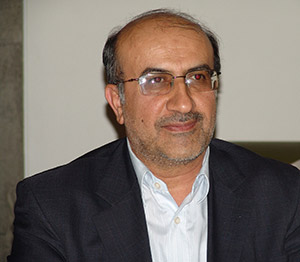The questions of oral historys interview (part I)
A Strong Interview Is Tied with Research
Akram Dashtban
Translated by: Fazel Shirzad
2018-6-19

Note: Following report is based on an invitation in which history experts are asked questions about oral history. In this regard, one of experts, as his perspective, has answered to one of questions titled "what are characteristics of the questions of oral history's interview"; Kianoush Haftlang (PhD) presented his responses in the form of notes that we'll read these comments as follows.
■
Oral history studies on the knowledge and experiences of informed individuals about events in an active, informed, and targeted conversation, and records audio and video tapes This method (i.e. oral history) is an important and necessary tool for understanding the past not so distant, and preserving the past of each individual and historical flows in various dimensions for the future.
Subject-tracking in oral history (interview's topic)
The first step for a creative dialogue and interview in oral history is selecting the subject or topic for interview. We must clearly know someone who we are going to interview with, and something what we are going to speak about, is the subject of interview about interviewee? Or someone else? What you are going to speak about?
Choosing a case and good subject is the first condition for conducting a substantive interview. Interview means conversation. But in practice, each of these words has different meanings and uses, and an interviewer needs to pay attention to them.
When two people communicate with each other verbally, conversation takes place. But necessarily this conversation does not mean an interview. Many telephonic talks and daily dialogues of people are conversational one. Interviews take place in the form of journalistic and oral history. In the interview, reporter asks number of questions for interviewee and get answers, while these questions are independent in the same unity.
In many cases, the first and second questions are not related to each other and are exactly made in the form of a written interview to answer the question of journalist who is not present. But questions, in spite of united, are interconnected and related. There is a kind of challenge between parties. In other words, it involves controversy or discussion. The first question, that is raised, is always in the aspect of the interview, and if reporter and interviewer are master on subject and familiar with interview techniques, s/he will be able to direct it toward a conversation.
Preparation before the interview
In addition to familiar with technique and methodology, interviewer should carefully study on topic of interview: before interviewing about subject, the use of archives, the study of document related to subject and the study of related subject books are such examples of gaining information. Professional researcher makes an interview stronger, more rigorous and richer forces.
Interviewee's situations in oral history
Interviewee should be informed before doing interview and given outline to prepare for herself/ himself, preferably write down or keep in his mind. The framework of interview should be already specified. We should not forget that we want response for unknown, not known, each question should have exact timing, the interviewer should take subject into consideration, and recorded interview should be transcribed, edited and legal issues should be raised and edited text should be signed by narrator.
How to make a fascinating interview
In addition information and expertise required on the subject of interview, the techniques of interview should also be mastered in order to provide a great interview. You should have full knowledge on the characteristics of a professional interview. How an interview is started, promoted and finished, providing portraiture and description in an interview, take notes and how to use them, and finally the way of arranging an interview are the points that if they are paid attention and considered, they causes interview to be enjoyable and interesting for readers.
Iranian oral history website asks question to experts about oral history, and publish responses to readers. Total responses will have remarkable results. If you have question, please feel free to submit it via this page to read comments from experts of oral history!
Number of Visits: 5060








The latest
Most visited
- From Nowhere-Land to Utopia
- Third Regiment: Memoirs of an Iraqi Prisoner of War Doctor – 4
- Comparing the Narratives of Commanders and Ordinary Combatants in the Sacred Defense
- An Sooye Divar (Beyond the Wall)
- Unveiling of the book: “Oral History: What and Why” — Report 2 (Final)
- 100 Questions/ 4
- Third Regiment: Memoirs of an Iraqi Prisoner of War Doctor – 5
- Challenges of Interviewing in Oral History
Mohammad — The Messiah of Kurdistan
Boroujerdi immediately said to Darvish, “Ready a few men; we’re going.” Then he moved toward Mostafa, who was studying the Kurdistan map. Mostafa straightened his back and said, “During my service in the army I experienced a full-scale war in Kurdistan. Guerrilla warfare in Kurdistan follows its own rules. The anti-revolutionary commanders want to draw us into a battle chosen on their terms.”From Javanrud to Piranshahr
The Memoir of Reza MohammadiniaThe book From Javanrud to Piranshahr recounts the life and struggles of Commander Reza Mohammadinia, who spent part of the Iran–Iraq War in the western and northwestern regions of the country. During those years, he held responsibilities such as deputy commander of the Seventh Region of the Islamic Revolutionary Guard Corps (IRGC), acting head of the Javanrud district, service on the southern fronts, director of ...
Tactical and Strategic Analysis and Limitations
The present paper, entitled “A Critical and Scholarly Study of Dr. Hossein Alaei’s Two-Volume Book: Tactical and Strategic Analysis and Limitations”, is a research work that examines and evaluates the two-volume book “An Analytical History of the Iran-Iraq War”. In this study, the strengths and weaknesses of the work are analyzed from the perspectives of content critique, methodology, and sources.

